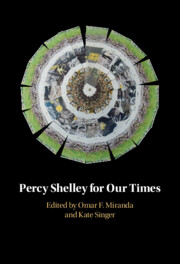Percy Shelley for Our Times
Two centuries after Percy Shelley’s death, his writings continue to resonate in remarkable ways. Shelley addressed climate change, women’s liberation, nonbinary gender, and political protest, while speaking to Indigenous, queer/trans, disabled, displaced, and working-class communities. He still inspires artists and social justice movements around the world today. Yet Percy Shelley for Our Times reveals an even more farsighted writer, one whose poetic methodology went beyond the didactic powers of prophetic art. Not historicist, presentist, or transhistorical, Shelley “for our times” conceives worlds outside himself, his poetry, and his era, envisioning how audiences connect and collaborate across space and time. This collection revitalizes a writer once considered an adolescent of idealist protest, showing how his interwoven poetics of relationality continually revisits the meaning of community and the contemporary. This title is part of the Flip it Open programme and may also be available Open Access. Check our website Cambridge Core for details.
Omar F. Miranda is Associate Professor of English and Comparative Literature at the University of San Francisco. He is the editor and author of several scholarly works on eighteenth- and nineteenth-century literatures. His article “The Global Romantic Lyric” (The Wordsworth Circle, 2021) won the Bigger 6 Article of the Year award (2021). He is currently Vice President of the Keats-Shelley Association of America and is on The Byron Society of America’s board of directors.
Kate Singer is Mary Lyon Professor of Humanities at Mount Holyoke College. She is the author of Romantic Vacancy: The Poetics of Gender, Affect, and Radical Speculation (State University of New York Press, 2019); coeditor, with Ashley Cross and Suzanne L. Barnett, of Material Transgressions: Beyond Romantic Bodies, Genders, Things (Liverpool University Press, 2020); and founding coeditor of the Keats Letters Project (https://keatslettersproject.com/). She currently serves as President of the Keats-Shelley Association of America.

